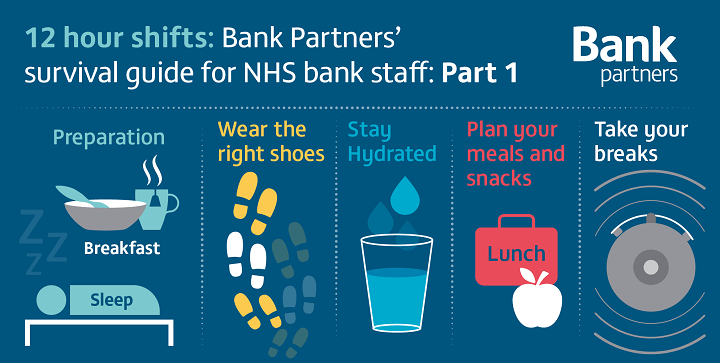
Love them or hate them, 12-hour shifts have become standard practice in many NHS trusts and across many ward areas. For some, this new way of working has certain advantages; working fewer days per week can be ideal – particularly for those with childcare or other carer considerations. However, there’s no denying that working on a ward for 12-hours straight can be gruelling.
Here at Bank Partners, we asked a few of our amazing bank nurses what they do to help them get though the day – or night. They had some great advice which we felt we had to share, so please read on for the Bank Partners 12-hour shift survival guide for NHS bank staff: 10 great tips for pushing through to home time!
Preparation
It's important to get a full night’s sleep before a long shift – at least six hours. Avoid caffeine or alcohol before you go to bed and try and have a restful evening. Eat a good breakfast, even if you don’t consider yourself to be a ‘breakfast person’. After all, you wouldn’t expect a car to drive 120 miles with no petrol!
Preparing for a night shift is a little different and you need to find the strategy that’s right for you. Some nurses find it useful to stay up late the night before (Skyping family and friends around the world or the latest box sets can help with this!) then sleep as much during the ensuing day. Others find it more effective to sleep as normal the night before and then, if possible, have a big carb-fuelled lunch and a long nap in the afternoon or early evening.
Wear the right shoes
Finding the right pair of work shoes can make a big difference to a nurse’s life. Wearing uncomfortable, ill-fitting shoes that don’t offer enough support will leave you with aching feet and, more seriously, long-term back and leg problems.
Fortunately, there’s a wide range of shoes that are perfect for nurses who are on their feet for hours on end so do your research and invest in a pair that’s best for you. Our nurses’ recommendations included Clarks, Hush Puppies and M&S Footgloves. Compression socks are also great for those of us whose feet and legs swell if standing for long periods of time.
Stay hydrated
Dehydration can lead to dizziness, nausea and confusion so it’s really important to keep drinking whilst on a shift. Although caffeinated beverages contribute to our daily fluid needs, caffeine can make you irritable and jittery so try to limit your intake. There’s nothing quite like water but if you don’t like the taste, try adding a slice of lemon or lime, or a dash of squash.
Sports and energy drinks can be useful: they contain carbohydrates and electrolytes that can increase energy levels and help the body to absorb water. However, choose wisely because they often contain extremely high levels of sugar and even sodium. Coconut water is a great alternative.
Plan your meals and snacks
You need to eat at least one meal and some snacks during your shift so it pays - both physically and financially – to plan your food. Keep your energy levels up by incorporating ‘slow release’, unprocessed foods into your meals such as cereal, sweet potato, brown bread, bananas, yoghurt, berries, eggs and beans. If you’re using the staff canteen, stick to salads, soups and jacket potatoes.
When you’re struggling through a long day, a chocolate bar from the vending machine or cake from the canteen may be tempting but try to resist. Sugary, processed snacks will give you a short-lived boost before lowering your energy levels, which could spell disaster for your day. Instead, grab a bag of nuts and an apple, or a banana and a brown-bread peanut butter sandwich.
Take your breaks
A 12-hour shift can put you under mental as well as physical strain so you need to take your breaks and use them wisely. If possible, work together with the other nurses in the ward to create a culture of mutual support; where staff can take rest and meal breaks without feeling they’re ‘abandoning’ their patients.
If you have a break of 20 minutes or more, consider taking a nap. Otherwise, find a quiet spot to clear your mind, listen to some music or read something you enjoy.
Read more in Part 2
Part 2 of our article offers even more tips for NHS bank staff to survive a 12 hour shift. If you feel you're already up for the challenge, search for NHS Bank jobs near you or register with Bank Partners for job alerts and more.
Also, share with us in the comments below. What do you do to make it through a 12 hour shift?